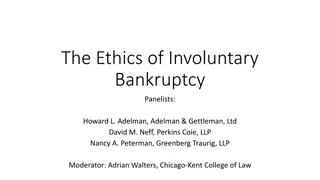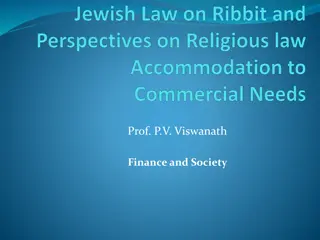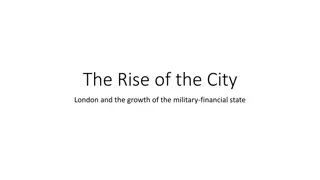Hebrew, Greek, and Roman Thought: An Overview
Hebrew civilization, with its roots dating back to 2500 B.C., intertwines various economic, political, ethical, and philosophical ideas. The Hebrews held unique beliefs on topics such as usury, commerce, labor, agriculture, and money, which shaped their societal structure and values.
1 views • 34 slides
The Seven Grave Sins and Their Consequences
The content discusses the concept of the seven grave sins in Islam, focusing on polytheism (shirk) as the foremost sin. It also delves into the impact of media channels, penalties for specific crimes, solutions for financial management, comparison of usury and trading, UAE's care for orphans, and th
0 views • 7 slides
Ethical Considerations in Involuntary Bankruptcy Cases
This content discusses three scenarios involving ethical dilemmas in the context of involuntary bankruptcy filings. From managers filing against fellow LLC members to lenders initiating bankruptcies for strategic reasons, the scenarios highlight complex issues such as creditor solicitation, usury de
0 views • 6 slides
Understanding Interest-Taking in Different Legal Systems
This text delves into the historical perspectives and legal frameworks surrounding interest-taking on money loans from the viewpoints of Aristotle, Islamic law, Jewish law, and additional rabbinical stringencies. It explores the origins of usury, prohibitions on interest in different religious tradi
0 views • 23 slides
The Evolution of London: Military-Financial State to Capitalist Metropolis
The rise of London as a military-financial state led to the growth of the aristocracy and state capitalism. The dissolution of monasteries fueled the rise of gentry and landholders, with practices like enclosure and rent-racking becoming common. The development of the credit system and the legalizat
0 views • 12 slides




